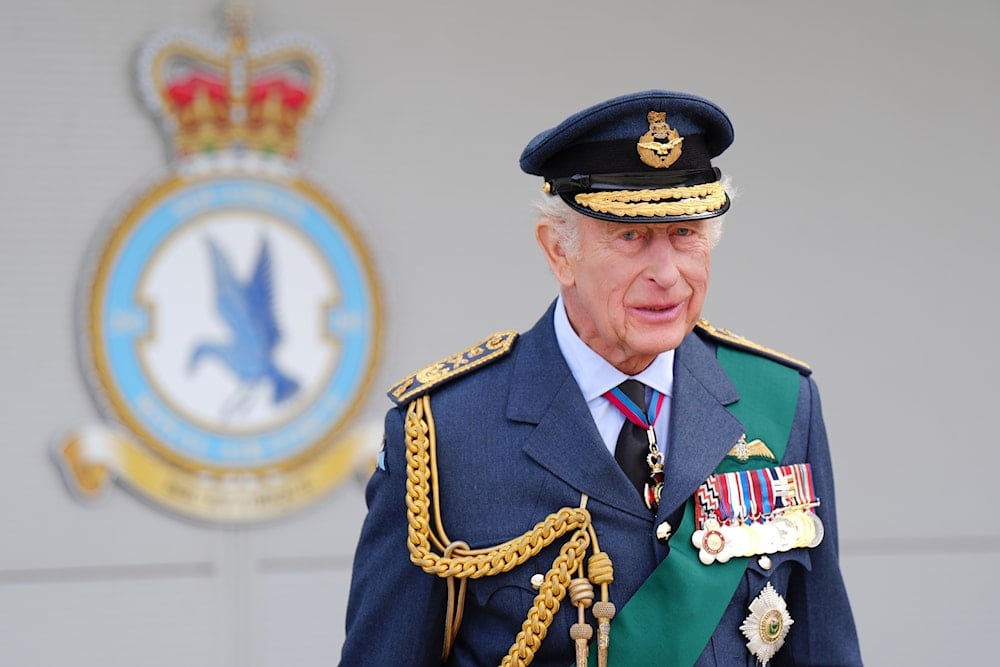UK faces backlash over costly King Charles portrait scheme
A UK scheme offering free King Charles III portraits to public bodies saw limited uptake, and the government’s refusal to disclose recipients has fueled criticism over secrecy amid waning support for the monarchy.
-

Britain's King Charles arrives to visit RAF Lossiemouth in Moray, Scotland, on August 6, 2025. (Jane Barlow/PA via AP, Pool)
A government scheme marking the start of King Charles III’s reign has faced criticism after more than 46,000 public institutions declined free portraits of the monarch.
The £2.7 million ($3.43 million) initiative offered framed images of the king in a Royal Navy uniform to town halls, universities, hospitals, job centres, and other public bodies, with then-Deputy Prime Minister Oliver Dowden calling the portraits “a reminder of the example set by our ultimate public servant."
While 20,000 portraits were distributed, with a 31% acceptance rate, uptake was uneven. Just 3% of hospitals, 7% of universities, and a quarter of Church of England churches requested a portrait, compared with 73% of national and local government bodies. All 23 coastguard stations took part.
Anti-monarchy protesters chanted "Not my King" as #KingCharles III arrived at a ceremony in #Edinburgh to celebrate his coronation.
— Al Mayadeen English (@MayadeenEnglish) July 5, 2023
The 74-year-old monarch arrived with his wife Camilla for a service of thanksgiving, where he will be presented with the "Honours of Scotland,"… pic.twitter.com/JrUDdn8x9i
The Cabinet Office has refused to disclose which institutions received the portraits, following The Guardian freedom of information request. Initially, officials argued that naming recipients could be an "actionable breach of confidence." When challenged, they shifted to citing a Freedom of Information Act exemption for the "effective conduct of public affairs."
Read next: Commonwealth natives call on the UK King to denounce colonial past
Officials claimed releasing the list could "trigger questions about why certain organisations requested the portrait and (by extension) why others did not," potentially distracting public bodies and creating "negative media coverage or reputational harm." They warned that such scrutiny might deter participation in future government schemes.
Declining public support for the Monarchy
The refusal comes against a backdrop of falling public support for the monarchy. YouGov polling shows that the proportion of adults who believe the monarchy is good for Britain has dropped from 60% in July 2019 to 51% in March 2024, while those viewing it as bad or neither good nor bad rose from 34% to 44%.
Graham Smith, chief executive of anti-monarchy campaign group Republic, said secrecy over taxpayer-funded portraits is unacceptable. "The whole point of freedom of information is to allow the public to judge the conduct and decisions of public authorities," he said, adding, "It is up to the public to determine whether they criticise those who do order or don’t order the portrait."
#Britons are more likely to say their views of the #monarchy have worsened than improved over the past decade, according to a #CNN poll.
— Al Mayadeen English (@MayadeenEnglish) May 6, 2023
What comes after #KingCharles' coronation? Will the anti-monarchy movement continue to grow in the #UK? pic.twitter.com/sW9Aq3PztT
Royal historian Dr. Ed Owens described the government’s stance as "a form of obfuscation" that reflects limited enthusiasm for the monarch. "The fact that hospitals haven’t unanimously requested portraits suggests there’s a disconnect between the monarchy’s public image and its actual relationship with public institutions like NHS hospitals," he said.
Owens noted that a century ago, royal portraits were common in most public buildings and many private homes. "The Cabinet Office seems to be playing an active role in seeking to protect the reputation of the monarchy … they are clearly anxious about this kind of information being used to discredit and to further undermine the monarchy’s public image," he added.

 3 Min Read
3 Min Read










